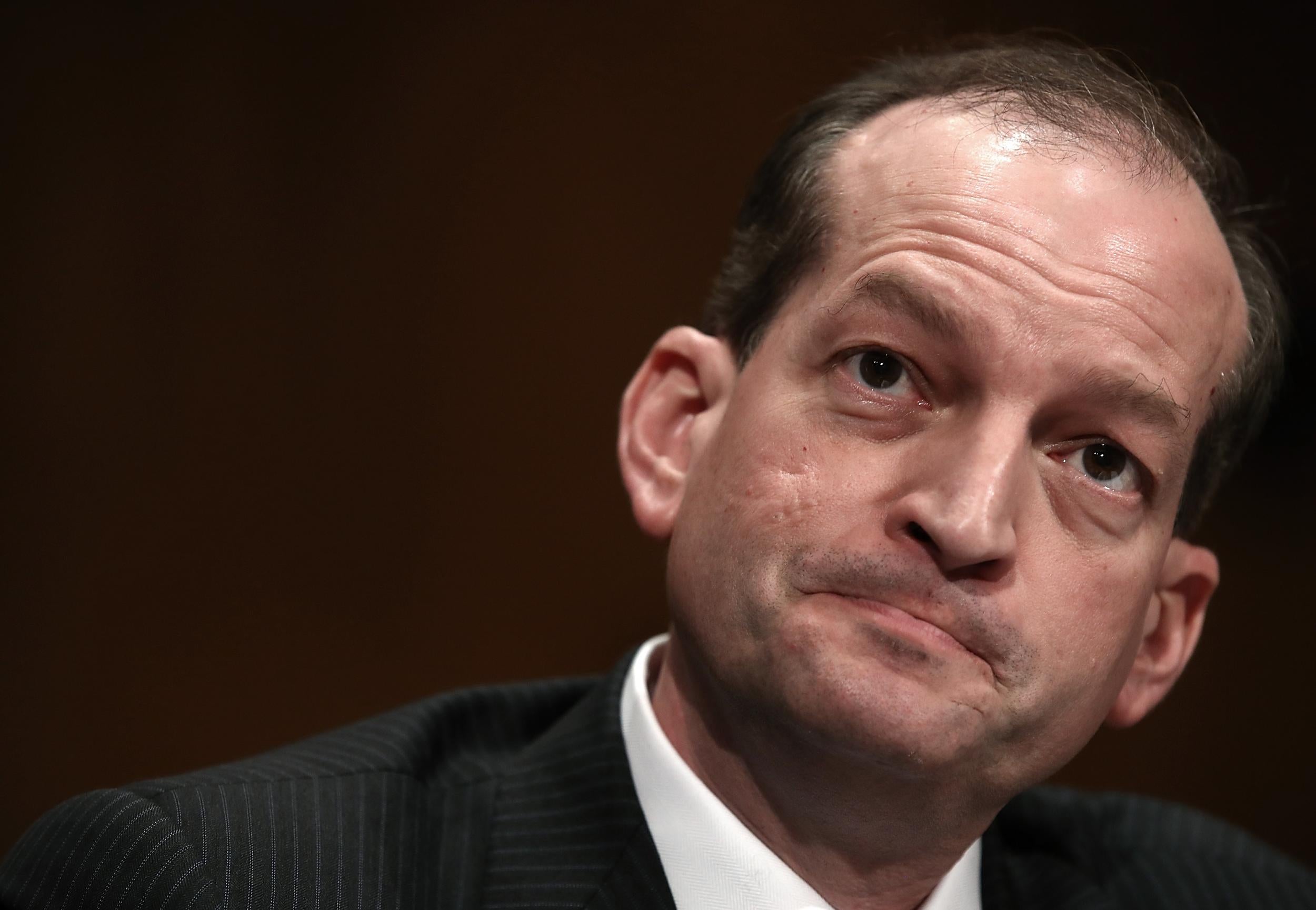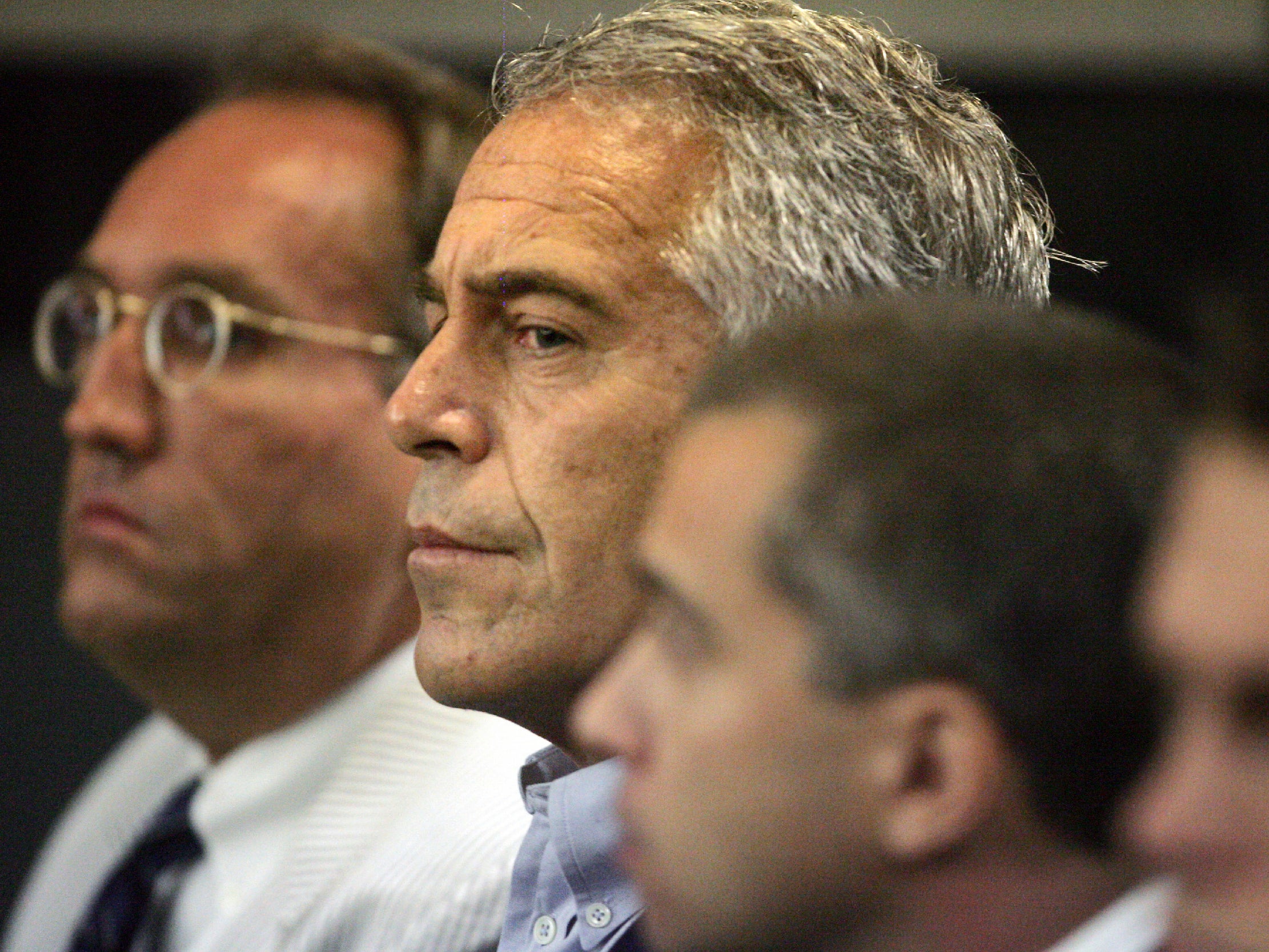Why did Trump's choice for Labour Secretary cut a deal with a billionaire in sex abuse case?
Donald Trump's nominee for Labour Secretary, Alexander Acosta, is at the centre of a Florida court battle over his decision a decade ago to cut a non-prosecution deal with a billionaire alleged to have sexually abused more than 40 underage girls

Your support helps us to tell the story
From reproductive rights to climate change to Big Tech, The Independent is on the ground when the story is developing. Whether it's investigating the financials of Elon Musk's pro-Trump PAC or producing our latest documentary, 'The A Word', which shines a light on the American women fighting for reproductive rights, we know how important it is to parse out the facts from the messaging.
At such a critical moment in US history, we need reporters on the ground. Your donation allows us to keep sending journalists to speak to both sides of the story.
The Independent is trusted by Americans across the entire political spectrum. And unlike many other quality news outlets, we choose not to lock Americans out of our reporting and analysis with paywalls. We believe quality journalism should be available to everyone, paid for by those who can afford it.
Your support makes all the difference.There was once a time – before the investigations, before the sexual abuse conviction – when rich and famous men loved to hang around with Jeffrey Epstein, a billionaire money manager who loved to party. They visited his mansion in Palm Beach, Florida. They flew on his jet to join him at his private estate on the Caribbean island of Little Saint James. They even joked about his taste in younger women.
President Donald Trump called Epstein a “terrific guy” back in 2002, saying that “he's a lot of fun to be with. It is even said that he likes beautiful women as much as I do, and many of them are on the younger side.”
Now, Trump is on the witness list in a Florida court battle over how federal prosecutors handled allegations that Epstein, 64, sexually abused more than 40 minor girls, most of them between the ages of 13 and 17. The lawsuit questions why Trump's nominee for Labour Secretary, former Miami US attorney Alexander Acosta, whose confirmation hearing is scheduled to begin on Wednesday, cut a non-prosecution deal with Epstein a decade ago rather than pursuing a federal indictment that Acosta’s staff had advocated.
Although Epstein's friends and visitors once included past and future presidents, rock stars and some of the country's richest men, he is no longer a social magnet. Epstein pleaded guilty to a Florida state charge of felony solicitation of underage girls in 2008 and served a 13-month jail sentence. Politicians who had accepted his donations, including former New Mexico Governor Bill Richardson and former New York Governor Eliot Spitzer, have scurried to give them back. (Harvard University kept a $6.5m [£5.2m] gift, saying it was “funding important research” in mathematics.)
But Epstein's unusually light punishment – he was facing up to a life sentence had he been convicted on federal charges – has raised questions about how Acosta handled the case. Former Palm Beach police chief Michael Reiter, whose department conducted the initial investigation into Epstein's behaviour, said in a civil lawsuit deposition that Epstein got off easy. “That wasn’t an appropriate resolution of this matter,” Reiter said, arguing that the charges levelled against Epstein were “very minor”, compared with what the facts called for. In a letter to parents of Epstein's victims, Reiter said justice had not been served.

Prosecutors in Acosta’s Miami office who had joined the FBI in the investigation concluded, according to documents produced by the US attorney's office, that Epstein, working through several female assistants, “would recruit underage females to travel to his home in Palm Beach to engage in lewd conduct in exchange for money ... Some went there as much as 100 times or more. Some of the women’s conduct was limited to performing a topless or nude massage while Mr. Epstein masturbated himself. For other women, the conduct escalated to full sexual intercourse.”
Epstein has a near-legendary reputation in New York financial circles as a money manager who made many millions for his clients. Although he never graduated from college, he taught advanced math at the Dalton School, one of the city's top private schools, and went on to be a successful trader at Bear Stearns before starting his own firm, J Epstein & Co., which managed the finances of clients who had a minimum of $1bn in assets.
Federal prosecutors detailed their findings in an 82-page prosecution memo and a 53-page indictment, but Epstein was never indicted. In 2007, Acosta signed a non-prosecution deal in which he agreed not to pursue federal charges against Epstein or four women who the government said procured girls for him. In exchange, Epstein agreed to plead guilty to a solicitation charge in state court, accept a 13-month sentence, register as a sex offender and pay restitution to the victims identified in the federal investigation.
“This agreement will not be made part of any public record,” the deal between Epstein and Acosta says. The document was unsealed by a federal judge in a civil lawsuit in 2015.
Reiter said in the 2009 deposition that federal prosecutors in Miami told him “that typically these kinds of cases with one victim would end up in a 10-year sentence”. Reiter said he was surprised not only by the decision to pull back from prosecuting the case, but also by the light sentence and liberal privileges granted to Epstein during his jail term.
Acosta did not return a call seeking comment. He explained his decision in a “To whom it may concern” letter that he released to news organisations three years after the decision: “The bottom line is this: Mr Jeffrey Epstein, a billionaire, served time in jail and is now a registered sex offender. He has been required to pay his victims restitution, though restitution clearly cannot compensate for the crime.” Acosta wrote that the case against Epstein grew stronger over the years because more victims spoke out after Epstein was convicted.
Acosta is Trump's second nominee to be Secretary of Labour; the first, Andrew Puzder, withdrew last month after Senate Republicans questioned his past employment of an undocumented housekeeper. Support for Acosta seems strong, as some Democrats and union leaders have joined with Senate Republicans in praising the nominee, who has been confirmed for federal positions three times in the past.
In the 2011 letter explaining his decision in the Epstein case, Acosta said he backed off from pressing charges after “a year-long assault on the prosecution and the prosecutors” by “an army of legal superstars” who represented Epstein, including Harvard Law professor Alan Dershowitz; Kenneth Starr, who as independent counsel led the investigation that brought about President Bill Clinton's impeachment; and some of the nation's most prominent defence attorneys, such as Roy Black, Gerald Lefcourt and Jay Lefkowitz.
“The defence strategy was not limited to legal issues,” Acosta wrote. “Defence counsel investigated individual prosecutors and their families, looking for personal peccadilloes that may provide a basis for disqualification.”
Dershowitz said in an interview that no such effort to rattle the prosecutors ever took place. “That's just dead wrong,” he said. “I would never participate in anything of that kind. Of course we investigated the witnesses but not Acosta's deputies. That's absurd.”
Acosta’s “intention was to indict, and he fought hard and tried to get the best deal he could,” Dershowitz said. “We outlawyered him.” Epstein did not return a call seeking comment.
Conchita Sarnoff, the author of TrafficKing, a book on the Epstein case, said in an interview that Acosta told her a few years after his decision not to prosecute that “he felt incapable of going up against those eight powerful attorneys. He felt his career was at stake”.
In his letter about the decision, Acosta, who has been dean of the law school at Florida International University since 2009, acknowledged that “some prosecutors felt that we should just go to trial, and at times I felt that frustration myself.” He also complained that Epstein “received highly unusual treatment while in jail”, including being allowed to serve much of his sentence in the county jail rather than a state prison, and being permitted to leave the jail six days a week to work at home before returning to jail to sleep.
“The treatment that he received while in state custody undermined the purpose of a jail sentence,” Acosta said.
Dershowitz said Acosta “was very anxious to prosecute” Epstein, but “we persuaded them that they didn't have enough evidence of interstate transportation” of the underage girls to warrant federal charges.
But Reiter, the former police chief, said the FBI had evidence “from flight logs or something” that an underage victim “was transported on an aircraft of Mr. Epstein”.
“Some may feel that the prosecution should have been tougher,” Acosta wrote. “Evidence that has come to light since 2007 may encourage that view.” But the prosecutor argued that his office’s investigation allowed state prosecutors to strengthen their charges against Epstein. And Acosta said that those who disagree with his decision “are not the ones who at the time reviewed the evidence available for trial and assessed the likelihood of success”.
The deal Acosta made with Epstein precluded any new federal prosecution based on offences he may have committed between 2001 and 2007, but in Florida, Trump is on the witness list in a civil case in which two attorneys accuse federal prosecutors of having deceived Epstein's victims by failing to inform them that they would not charge Epstein.
Lawyers for the women argue that they had a right under the federal Crime Victims' Rights Act to know about Acosta's deal with Epstein. They say Acosta sought to keep the deal under wraps to avoid “the intense public criticism that would have resulted from allowing a politically-connected billionaire” to escape from federal prosecution.
Although Trump and Bill Clinton flew on Epstein's plane and visited his homes, neither president has been accused of taking part in the sexual misdeeds. But lawyers for Epstein's victims say Trump nonetheless may have useful information. Trump banned Epstein from his Mar-a-Lago Club in Palm Beach “because Epstein sexually assaulted an underage girl at the club”, Bradley Edwards, an attorney who represents three of the young women, said in court documents.
Lawyers involved with the various Epstein cases said there is virtually no chance that the President will be required to testify in a matter in which both sides agree his involvement was tangential.
Trump and Clinton are both among the dozens of names that appeared in a “black book” of Epstein's phone contacts that his houseman, Alfredo Rodriguez, obtained. Rodriguez, who died in 2015, was convicted of obstruction of justice in 2010 after he tried to sell the book for $50,000 to lawyers representing Epstein's victims. In the book, Rodriguez circled the names of contacts he said were involved in sexual misbehaviour at Epstein’s properties. There were no circles around the names of Trump, Clinton or other boldfaced names such as former Israeli Prime Minister Ehud Barak, former British Prime Minister Tony Blair, and celebrities Mick Jagger, Michael Jackson, David Frost and Jimmy Buffett.
Rodriguez spent 18 months in prison, five months longer than Epstein served in jail. Epstein has continued to move among his homes in New York City, where he owns one of the largest private residences in Manhattan, Palm Beach and the Caribbean.
© Washington Post
Join our commenting forum
Join thought-provoking conversations, follow other Independent readers and see their replies
Comments